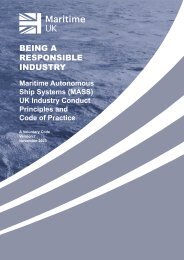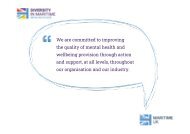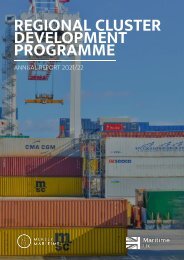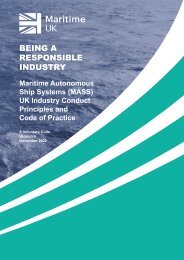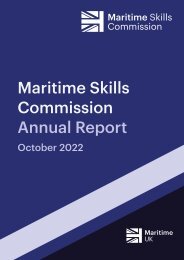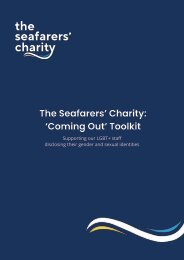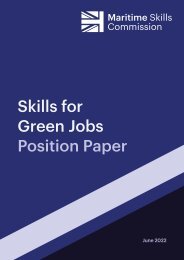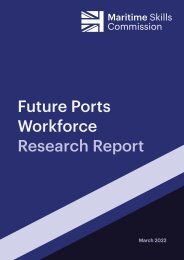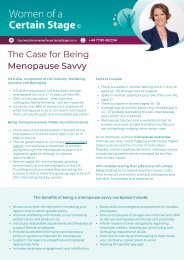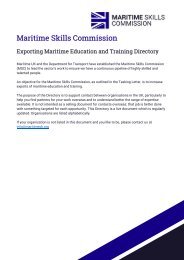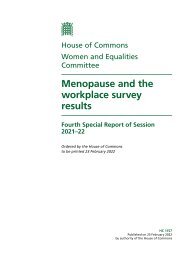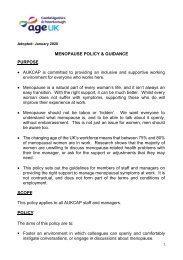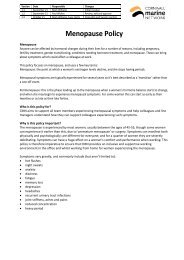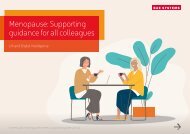HR Guidance for Recruiters - May 2020
This recruitment guideline has been developed by Maritime UK and intends to highlight the ways in which basic assumptions and unconscious biases affect the ways in which jobs are advertised, as well as the easy steps that can be taken to create a more conscious recruitment process.
This recruitment guideline has been developed by Maritime UK and intends to highlight the ways in which basic assumptions and unconscious biases affect the ways in which jobs are advertised, as well as the easy steps that can be taken to create a more conscious recruitment process.
Create successful ePaper yourself
Turn your PDF publications into a flip-book with our unique Google optimized e-Paper software.
GUIDANCE<br />
FOR RECRUITERS<br />
Why we should care that diversity is welcomed<br />
when recruiting <strong>for</strong> the maritime sector,<br />
and what we can do about it.<br />
@MUKDiversity<br />
@MaritimeUK
<strong>Guidance</strong> <strong>for</strong> recruiters - 3<br />
Foreword<br />
Welcome to this recruitment guideline, created to support<br />
diversity in our maritime sector.<br />
This recruitment guideline has been developed<br />
by Maritime UK’s Women in Maritime Network,<br />
and intends to highlight the ways in which basic<br />
assumptions and unconscious biases affect the<br />
ways in which jobs are advertised, as well as<br />
the easy steps that can be taken to create a more<br />
conscious recruitment process. The document<br />
uses gender bias as the key example, as this<br />
is an area in which extensive research and<br />
in<strong>for</strong>mation has become available over the past<br />
few years. While focused on gender however,<br />
neutrality is beneficial in the recruitment across<br />
many diversity groups. The document ultimately<br />
aims to initiate a thought-process around<br />
recruitment that leads to increased awareness<br />
about diverse recruitment in the maritime sector.<br />
According to research, advertising a job with<br />
gender-neutral language fills a position 14 days<br />
faster than those with a feminine or masculine bias,<br />
and also attracts a more diverse pool of applicants<br />
(Women in Recruitment, 2018). Further, both men<br />
and women are found to be less likely to apply to<br />
a job that is described using language biased<br />
against their gender.<br />
No industry, or indeed country, can reach its<br />
full potential if only recruiting from a fraction<br />
of the talent on offer. Moral imperatives aside,<br />
research clearly indicates that companies with<br />
diverse work<strong>for</strong>ces outper<strong>for</strong>m those that are<br />
less diverse, both financially, and in terms of<br />
innovation. There is there<strong>for</strong>e a clear business<br />
case <strong>for</strong> companies and organisations within the<br />
maritime sector to act. The future is incredibly<br />
exciting, and the potential opportunities<br />
and rewards are vast. We would encourage<br />
companies to actively use and engage with this<br />
resource. With your help, we can make sure that<br />
our sector embraces talent from everywhere.<br />
This booklet is only one small element of the<br />
significant work being undertaken across our<br />
sector to help create the maritime industry of the<br />
future. An industry in which we can all be proud,<br />
and where everyone, regardless of race, gender,<br />
or any other characteristic may feel welcome<br />
and thrive.<br />
We would like to thank the following <strong>for</strong> their<br />
significant contributions to this document:<br />
Professor Averil MacDonald, Maritime UK’s<br />
Women in Maritime Network and Recruitment<br />
Subgroup, the Institute of Chartered Shipbrokers,<br />
the Department <strong>for</strong> Transport, and all members<br />
of Maritime UK.<br />
DIVERSITY<br />
IN MARITIME<br />
95%<br />
of all UK trade<br />
220,100<br />
jobs directly supported<br />
$3 trillion<br />
by 2030<br />
Read more:<br />
womeninrecruitment.org/article/<br />
writing-gender-neutral-job-ads-23.aspx<br />
Introduction<br />
The UK maritime sector facilitates 95% of all<br />
UK trade and is larger than the automotive<br />
and aerospace transport industries combined.<br />
The UK maritime sector also directly supports<br />
220,100 jobs. While hugely valuable to the UK<br />
economy, the sector is predicting a skills and<br />
labour shortage compounded by an ageing<br />
work<strong>for</strong>ce, poor perception of jobs in the<br />
sector, and a lack of diversity especially in<br />
relation to gender and BAME.<br />
Studies highlight that diversity is a key driver<br />
of innovation, and is a critical component of<br />
global success (Forbes, <strong>2020</strong>). As an island<br />
nation with a rich maritime heritage, it is<br />
essential <strong>for</strong> future success that the UK sector<br />
is able to draw from the full pool of talent when<br />
recruiting. A lack of diversity caused by real or<br />
perceived barriers limits the number of people<br />
entering the sector, and hampers maritime<br />
innovation and growth.<br />
But the future is bright; the global ‘blue economy’<br />
is expected to be worth over $3trillion by 2030.<br />
There has never been a better time to join the<br />
maritime sector, or more important to embrace<br />
the full breadth of talent on offer.<br />
<strong>for</strong>bes.com/sites/<br />
<strong>for</strong>besinsights/<strong>2020</strong>/01/15/diversityconfirmed-to-boost-innovation-andfinancial-results/#2ec9b0a2c4a6
4 - <strong>Guidance</strong> <strong>for</strong> recruiters<br />
<strong>Guidance</strong> <strong>for</strong> recruiters - 5<br />
Why diversity matters<br />
Making the case to Senior Management<br />
Executive buy-in is a necessity<br />
The moral imperative<br />
Companies should be working to create more diversity<br />
Group-think curbs creativity<br />
A team made up of the same kind of people<br />
As an executive, your interest should be running<br />
your organisation in the best way possible.<br />
Maritime does not just have one face –<br />
the sector needs to embrace diversity and<br />
in their organisations, not only because it makes<br />
feel they get along and communicate well because<br />
inclusion in order to reflect the true range of<br />
business sense, but because it is the right thing to do.<br />
they have an intuitive understanding of each<br />
Writing words on a piece of paper does not make<br />
talent participating across the board. There<br />
other. This, however, means that members of<br />
a culture; having leaders commit to change by<br />
is no quick-fix to solve the issues facing the<br />
the team are less likely to challenge each other,<br />
embodying new ideas will. A shift in the industry<br />
maritime sector and its industries as a whole,<br />
as the ideas they produce will be largely similar.<br />
cannot be expected without engaging those at<br />
but by taking some simple steps you can<br />
A diverse work<strong>for</strong>ce delivers<br />
greater productivity<br />
Companies in the top quartile <strong>for</strong> gender diversity<br />
outper<strong>for</strong>m their competitors by 15% and those in<br />
the top quartile <strong>for</strong> ethnic diversity outper<strong>for</strong>m their<br />
competitors by 35% ((McKinsey, 2015). Furthermore,<br />
when employers believe their organisation is<br />
committed to and supportive of diversity, their ability<br />
to innovate increases by 83% (Deloitte, 2013).<br />
This effect is called ‘group-think’, and makes the<br />
team less creative. Expanding diversity in the<br />
workplace is a way to interject fresh ideas into an<br />
otherwise stagnant environment, and incorporates<br />
new perspectives which encourage a nuanced<br />
approach to problem solving. Engineering the<br />
recruitment process to attract a more diverse<br />
work<strong>for</strong>ce has many benefits and creates a more<br />
productive business.<br />
the top level.<br />
Creating environments where people of<br />
all races, genders, ages, sexualities, religions,<br />
socio-economic backgrounds and abilities<br />
feel they can bring their true selves to work is<br />
fundamental to good business. Feeling a sense<br />
of belonging will empower your employees, and<br />
empowered employees will ensure the maritime<br />
sector of tomorrow is a better place than today.<br />
impact the composition of the future maritime<br />
work<strong>for</strong>ce, and ultimately achieve a healthier<br />
bottom line.<br />
Retention and reputation<br />
Creating a working environment where people feel<br />
Recruiting and retaining<br />
women and increasing<br />
they can be themselves, are included and valued will<br />
translate to a higher retention rate across the board,<br />
<strong>for</strong> both staff and management. The more welcome<br />
someone feels, the more likely they are to stay. A rich<br />
and diverse work<strong>for</strong>ce will send positive signals to<br />
diversity in the workplace<br />
has significant benefits to<br />
business productivity and<br />
creativity.<br />
the local community, and an enhanced reputation will<br />
attract greater numbers of applicants in a potential<br />
recruitment process.<br />
Read more:<br />
mckinsey.com/business-functions/<br />
deloitte.com/content/dam/Deloitte/au/<br />
organization/our-insights/whydiversity-matters<br />
Documents/human-capital/deloitte-auhc-diversity-inclusion-soup-0513.pdf
6 - <strong>Guidance</strong> <strong>for</strong> recruiters<br />
<strong>Guidance</strong> <strong>for</strong> recruiters - 7<br />
Diverse<br />
recruitment<br />
Values – the dangers of ‘salary negotiable’<br />
Not everyone is driven by money. Acknowledging<br />
The importance of motivation<br />
While ‘Generation Y’ and ‘Millennials’ are terms<br />
that job applicants have different motivations<br />
frequently used by the media to describe certain<br />
ensures that the way an advertisement is created<br />
age-groups, little attention is paid to the rationale<br />
You can’t appoint the best person<br />
<strong>for</strong> the job if they don’t apply<br />
Embracing diversity and inclusion strategies is<br />
does not exclude applicants with other than<br />
financial motivations. For some, and this is typically<br />
more common among female applicants, the desire<br />
to ‘make a difference’ is more important than the<br />
behind these labels, and the ways in which<br />
this knowledge could be useful to recruiters.<br />
Sociological research shows that we are<br />
influenced by the world into which we are born<br />
crucial to ensuring that the talent pipeline meets<br />
salary listed. While not the main motivator however,<br />
and brought up. People born within the same<br />
current and future skills needs. Diversifying<br />
the salary listed is often helpful in positioning the<br />
generation are there<strong>for</strong>e often found to have<br />
interview panels and using gender neutral<br />
job, and <strong>for</strong> the applicant to determine whether the<br />
similar values and motivations that will affect<br />
language in job applications will ensure candidates<br />
role is appropriate. There<strong>for</strong>e, when a job advert<br />
what they find attractive and motivating in their<br />
are less likely to come from a limited demographic.<br />
indicates “salary negotiable”, many candidates,<br />
lives. Understanding these shared values and how<br />
Thinking actively and creatively about where a<br />
position is advertised may also have a significant<br />
impact on the array of applicants. Similarly,<br />
acknowledging that recruitment is a two-way<br />
process, by asking what your employees need<br />
and adapting accordingly, may be key to attracting<br />
the kind of candidates you want.<br />
How do you ensure that the<br />
best person applies <strong>for</strong> a job?<br />
It is often assumed that the employment market<br />
is a “seller’s market”, where simply having a<br />
great job on offer will ensure a large number of<br />
Examples of “feminine”<br />
words include:<br />
Careful, committed, communal,<br />
connected, considerate, cooperative,<br />
dependable, empathic, honest,<br />
interpersonal, interdependent, kind,<br />
loyal, modest, nurturing, people-focused,<br />
pleasant, polite, quiet, responsible,<br />
sensitive, supporting, sympathetic,<br />
trustworthy, understanding, warm.<br />
Examples of “masculine”<br />
words include:<br />
Active, adventurous, ambitious,<br />
also predominantly female, do not engage in the<br />
worry that they may not do well in a negotiation.<br />
Women are widely known to ask <strong>for</strong> lower<br />
salaries, and a clearly stated salary range allows<br />
all candidates, regardless of motivations, to<br />
accurately position the role and what level the<br />
role is at.<br />
Managing expectations<br />
An important factor of the recruitment<br />
process is creating realistic expectations of<br />
the role advertised. Being overly specific about<br />
requirements <strong>for</strong> an applicant’s prior experiences<br />
to employ them in the recruitment process can<br />
there<strong>for</strong>e be helpful when attempting to engage<br />
a particular audience.<br />
Current leaders at senior levels are likely to<br />
be representatives of different generations than<br />
those an organisation are attempting to recruit<br />
at lower levels of seniority. It is important<br />
to acknowledge that these groups have<br />
different values and motivations than those<br />
of their potential employers and recruiters.<br />
If an advertisement aims to attract a wide<br />
range of applicants, it is important to have an<br />
understanding of what motivates its<br />
target audience.<br />
qualified candidates. It has been seen, however,<br />
analytical, assertive, connected,<br />
risks putting off ideal candidates, as the role<br />
that recruitment in certain sectors, such as<br />
autonomous, challenging, competent,<br />
is seen as overly demanding from the outset.<br />
maritime, tends to attract an overwhelming<br />
confident, courageous, decisive,<br />
Women have traditionally been conditioned to<br />
majority of male applicants. It is self-evident<br />
determined, dominant, <strong>for</strong>ceful,<br />
value modesty over boastfulness. An implication<br />
that ignoring the talents of half the population,<br />
impulsive, independent, individual,<br />
of boastfulness within an advert may there<strong>for</strong>e<br />
even if by omission, means trawling lower levels<br />
intellectual, leader, logical, merit,<br />
make certain candidates uncom<strong>for</strong>table.<br />
of mediocrity to recruit people <strong>for</strong> necessary<br />
objective, opinionated, outspoken,<br />
Sentences such as “We will consider exceptional<br />
positions. An awareness of language, values<br />
persistent, principled, superior,<br />
applicants as soon as relevant positions become<br />
and motivators is key in creating a wider appeal<br />
self-confident, self-sufficient,<br />
available” are unlikely to attract many female<br />
in the recruitment process.<br />
self-reliant, talent.<br />
applicants.
8 - <strong>Guidance</strong> <strong>for</strong> recruiters<br />
<strong>Guidance</strong> <strong>for</strong> recruiters - 9<br />
What do<br />
they want?<br />
The best advertisements should make a job sound<br />
enticing and enable the applicant to easily envisage<br />
themselves in the role, as well as belonging in the<br />
working environment.<br />
Where to go<br />
from here?<br />
Additional resources and points of contact that<br />
may be of use in the continued work to increase<br />
diversity within your organisation, and in the<br />
maritime sector as a whole:<br />
Recruitment tools and resources<br />
Women in Maritime Interview Pool:<br />
Diversity in Maritime Events:<br />
Events and professional development opportunities<br />
More diverse interview panels and those with<br />
are frequently put on through the Diversity in<br />
These advertisements<br />
typically include:<br />
A defined salary range<br />
A balance between feminine and<br />
masculine words<br />
References to personal attributes as well<br />
as skills and qualifications<br />
Realistic requirements of prior experience<br />
Statements about what the employer is<br />
offering, beyond salary<br />
An evocation of an environment that<br />
invites belonging<br />
The worst adverts tend to make<br />
potential applicants exclude themselves<br />
as they contain certain warning-signs,<br />
such as:<br />
Open salary negotiation<br />
Expectations of already achieved training,<br />
qualifications and experience, implying<br />
no flexibility<br />
Too many demands<br />
Requires the applicant to be immodest<br />
or boastful<br />
Provides no evidence that the applicant<br />
will benefit in terms of training and<br />
careers development<br />
Provides no in<strong>for</strong>mation about<br />
additional benefits<br />
specific training <strong>for</strong> recruitment bias are more<br />
likely to recruit a diverse work<strong>for</strong>ce. Access to<br />
best practice in this area and crucially the ability<br />
to create interview panels that are gender<br />
balanced is available through the Women in<br />
Maritime Interview Pool which loans maritime<br />
women to companies.<br />
Diversity in Maritime Toolkit:<br />
Online resources on best practice, internal<br />
policies, recruitment, retention and other areas<br />
of interest to achieving greater diversity in<br />
the workplace are being collated in this<br />
online toolkit.<br />
Gender Bias Decoder:<br />
A free online tool that identifies gendered words<br />
in e-mails, job descriptions and other texts.<br />
Supporting networks<br />
Diversity in Maritime Task<strong>for</strong>ce and<br />
supporting networks:<br />
The Diversity in Maritime Task<strong>for</strong>ce has<br />
been established to ensure the increased<br />
and continued diversification of the maritime<br />
work<strong>for</strong>ce. The Task<strong>for</strong>ce is supported by a<br />
number of Networks and Subgroups focused<br />
Maritime Task<strong>for</strong>ce in collaboration with different<br />
networks. The events are open to all.<br />
Careers resources<br />
Maritime Careers:<br />
There are many routes into a career in maritime and<br />
a suite of resources are available; from free careers<br />
events, visits to schools by industry ambassadors<br />
and online materials <strong>for</strong> parents and teachers.<br />
Maritime and Me:<br />
A campaign funded by the Department <strong>for</strong> Transport,<br />
featuring case studies of women in a diversity of<br />
roles from across the maritime sector.<br />
Read more:<br />
maritimeuk.org/<br />
programmes/people/<br />
diversity-maritime/<br />
women-maritime/<br />
interview-pool<br />
maritimeuk.org/<br />
programmes/people/<br />
diversity-maritime/<br />
women-maritime/toolkits<br />
maritimeuk.org/<br />
programmes/people/<br />
diversity-maritime<br />
maritimeuk.org/<br />
events/events<br />
maritimecareers.uk<br />
maritimeuk.org/careers/<br />
maritime-and-me<br />
on specific issues. All are welcome to<br />
totaljobs.com/insidejob/<br />
participate.<br />
gender-bias-decoder
30 Park Street<br />
London<br />
SE1 9EQ<br />
020 7417 2837<br />
@MUKDiversity<br />
@MaritimeUK<br />
maritimeuk.org<br />
© Copyright Maritime UK <strong>2020</strong>




